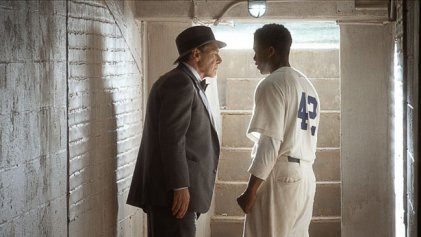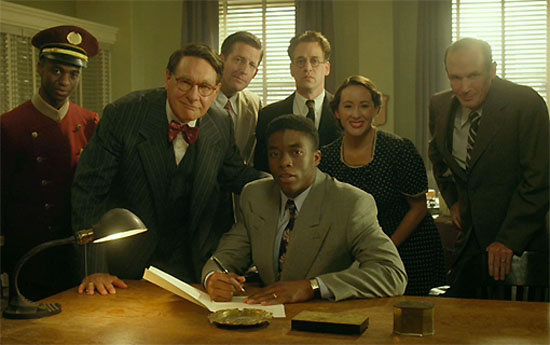Directed by Brian Helgeland
Written by Brian Helgeland
USA, 2013
The majority of baseball movies come pre-set with a dollop, if not a heaping scoop of hokey, cornpone jingoism. It’s all but impossible for a director to not indulge in well-worn clichés and cinematic tropes when recreating great moments of the truest American pastime. Brian Helgeland, writer and director of the new film 42, documenting Jackie Robinson’s legendary journey to become the first African American Major League Baseball player, isn’t able to resist such expected moments. Familiarity aside, 42 is an enjoyable if old-fashioned period piece packed to the rafters with a solid cast who help enliven the proceedings with something fresh.
Chadwick Boseman stars as Robinson, a playful, hot-tempered player for the Kansas City team in the Negro Leagues. In 1945, he’s handpicked by Branch Rickey (Harrison Ford), owner of the Brooklyn Dodgers, to become the first Black player in the MLB. Rickey is prepared for the furious, swirling tempest of latent racism still running throughout the country, but believes it’s time for a change in the sport and that he’s the man to help push baseball out of the 19th century. Robinson, along with his wife Rachel (Nicole Beharie), tries to stay above the fray even as many players, including his Dodger teammates, revolt against the idea of integrating the major leagues.
42 is far from perfect, its flaws best exemplified in the oddly structured first act. Helgeland stacks the deck by including a strange prologue narrated by Robinson’s devoted follower and sportswriter Wendell Smith (Andre Holland) that essentially serves as a quickie reminder that Jackie Robinson was the first African American to play in the major leagues. Seeing as the following film explains that prologue in great detail, it feels awfully extraneous and distracting. Once Robinson makes the trek to Daytona Beach to begin spring training with the Dodgers farm team, 42 settles into a comfortable, if familiar groove. Perhaps the only surprise within the rest of 42 is that, for all the legitimate struggles and frustrations Robinson faced, his relationship with Rachel is portrayed as consistently happy and rewarding. 42 thankfully steers clear of any dusty, seen-it-before spousal arguments about the risks he’s taking.
Boseman and Beharie, in their scenes together, portray the Robinsons’ romance charmingly, as one filled with delight amidst any public battle Robinson may have faced. And throughout, Boseman is a grounding force, taking heat on all sides with dignity and grace. The extensive supporting cast are all capable and lively, so much so that you wish they’d get a bit more to do. Christopher Meloni, as manager Leo Durocher; John C. McGinley, as famed announcer Red Barber; and Lucas Black, as Pee Wee Reese are standouts, all welcome sparks in what may have been stale plotlines. And fans of the cult sci-fi show Firefly may be surprised to see one of that show’s stars, Alan Tudyk, play a fiercely bigoted rival manager. His faceoff with Robinson during a game, a centerpiece of the film, is appropriately tense, and though its culmination may be expected, it satisfies.
Which leaves us with Harrison Ford, dressed in tweedy jackets, bow ties, and bifocals as the legendary Rickey. Ford, despite his neverending stardom, does not often stretch as an actor outside of his gruff, action-hero comfort zone. While Rickey is certainly a low-voiced, tough icon of baseball, Ford does some heavy lifting here, contorting his face a wee bit to emphasize the difference between his movie-star persona and this character. Ford’s fine as Rickey, yet his being the most famous face takes away just slightly from 42’s authenticity. Ford’s stern paternal glare is put to good use in the film, but it’s hard not to see Indiana Jones peering behind those bifocals.
If nothing else, 42 should remind its viewers of the greatness of baseball, in spite of its roiling imperfections that were once well above the surface. Jackie Robinson was far more than a mythic hero, even if people lifted him up on society’s shoulders almost as soon as he put on the jersey numbered 42. Helgeland sometimes fails to keep his lead rooted in reality, but most of the chapters in this episodic story are winning and entertaining. This movie never reaches the same heights that true classics of the genre like Field of Dreams do, yet it’s an assured, if slightly overlong, story steeped in well-worn Americana.
— Josh Spiegel




